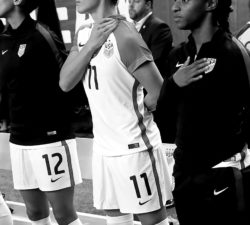The United States has a heritage of athlete political and civic engagement. American athletes’ civil rights advocacy, a decades-old phenomenon, rose to international attention in the 1960s. Olympic track stars Tommie Smith, John Carlos, and Wyomia Tyus, NBA champions Bill Russell and Kareem Abdul-Jabbar, tennis aces Arthur Ashe and Billie Jean King, and boxing great Muhammad Ali are among those known for their protests. Today they’re considered trailblazers but at the time they suffered consequences: Smith and Carlos lost their sponsorships and livelihoods, Ali was denied his boxing licence for several years, while Ashe was stripped of the captaincy of the US Davis Cup team. Athletes who spoke out continued to be shunned or overlooked. Players in the Women’s National Basketball Association (WNBA), proactive advocates since the league’s 1996 founding, didn’t gain greater attention for their efforts until July 2016 when the Minnesota Lynx protested over the police…


